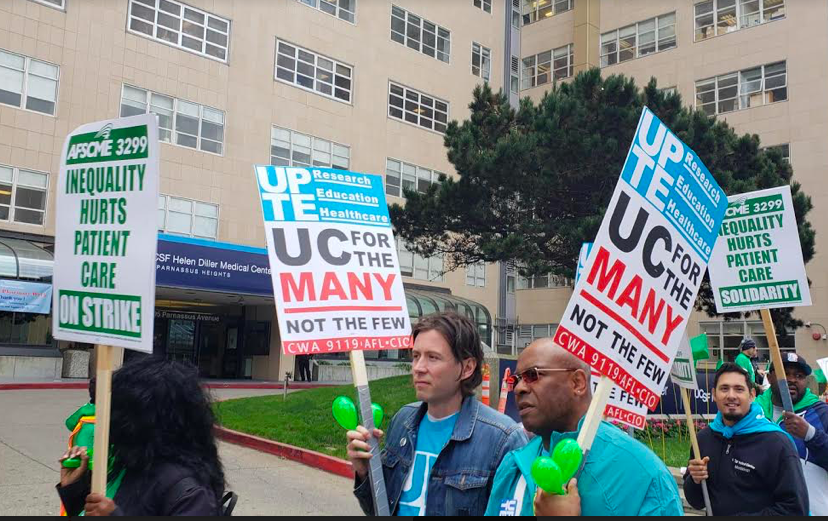I’m a clinical social worker employed by the University of California San Francisco—a public university—which partners with public agencies to address a public health crisis. But what kind of public accountability is my employer subject to?
I believe UCSF is operating a two-tiered mental health care system in SF that is contributing to the crisis we see in our city. It turns out there’s very little that state and local governments and regulators can do about it, although last month, the San Francisco Board of Supervisors passed a nonbinding resolution calling this disparity out.

I’m a Black woman and mother who came to social work motivated by first-hand experience with community violence. I work on the frontlines of our city’s mental health crisis at the Trauma Recovery Center in a role UCSF calls “Campus CSW.” I provide trauma-informed care to acute survivors of violent crimes like sexual assault, domestic violence, and shootings. I often meet clients right after these incidents in the emergency room, the community, or our clinic.
I provide therapy and help survivors navigate the many hurdles survivors face, like filing police reports, applying for restraining orders, relocating, and securing emergency financial resources. For many, this isn’t their first experience with violence.
I am exhausted to find myself fighting systems of oppression within UCSF while simultaneously fighting the systemic inequality that oppresses our clients.
“Campus CSWs” like me are largely funded by federal, state, and local grants. Our clients often come from underserved populations. Between 2001 and 2018, about two-thirds of the people we served at the TRC were from communities of color. Data show that the disparities in outcomes that often exist based on survivors’ age, education, and housing status are eliminated or greatly reduced by access to care at a TRC.
“Medical Center CSWs,” on the other hand, work at UCSF facilities like Parnassus Heights, Mission Bay, or the Langley Porter Psychiatric Institute, primarily treating admitted patients who are more likely to be white and privately insured, and assisting with discharge planning and coordination of ongoing care.
Despite similar experience, education, and licensure requirements, Campus CSWs earn 32 percent less on average than Medical Center CSWs, leading to high turnover and chronic understaffing for Campus CSWs and delayed care for our most vulnerable patients. These pay inequities are also corrosive to morale and trust and exacerbate burnout.
That’s not only unfair, it’s making it much harder for us to do the job the city and the community expect from us on the frontlines of San Francisco’s mental health crisis.
Earlier this year, I was unsurprised to learn that other UC workers face similar problems when optometrists, represented by the Union of Professional and Technical Employees at UC, held an unfair labor practice strike in February, which highlighted UC’s disregard for the rights of employees as well as burnout, chronic vacancies, and life-threatening delays for patients.
It isn’t that UC can’t afford to address this issue—we entrust them with tremendous public resources. The university also generates enormous profits which have allowed it to accumulate roughly $26.9 billion in reserves and billions more in long-term investments, while going on a spending spree this year to acquire nearly a dozen new hospitals.
While we deeply appreciate the supervisors who passed a resolution condemning this two-tier system of care earlier this week, we also understand what we are up against. On our side we now have a non-binding resolution of the City and County of San Francisco. The University, on the other hand, can call upon the Constitution of the State of California, which exempts it—by name—from public oversight.
So what can we do? Negotiations are underway between UC and thousands of its healthcare, research, and technical staff who belong to our union, including here at UCSF. My fellow union members and I are pushing UC to reinvest their profits back into our services, yet dozens of unfair labor practices are pending against UC for the same bad-faith negotiations that led to this year’s optometrist strike.
In the meantime, turnover and vacancies continue to impact the delivery of care to the most vulnerable members of our community.
Solving San Francisco’s mental health crisis is an urgent priority. The Department of Public Health has entrusted UCSF with some of the most challenging parts of that work and my coworkers and I have the skills, experience and passion for the task. All that is missing is the adequate support and resources we need to be there for others on the worst days of their lives.
I want to focus my energy on the clients who need me. I’m passionate about improving their outcomes. I hope the University of California won’t force my coworkers and I onto the picket line, but if no one else can hold them accountable, we will.
Jillian McCoy is a clinical social worker at UCSF.





